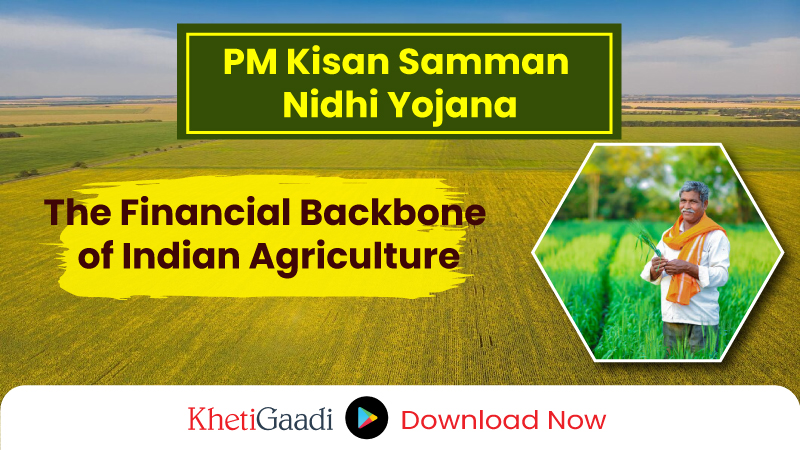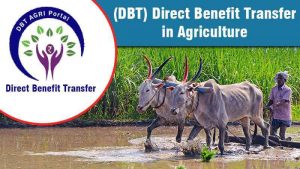A Comprehensive Guide to the PM Kisan Samman Nidhi Scheme
In the vast and diverse agricultural landscape of India, supporting farmers has always been a priority for the government. The PM Kisan Samman Nidhi Yojana (PM-KISAN) is a significant initiative launched by the Government of India to provide direct financial assistance to the country’s small and marginal farmers. This blog delves into the details of the scheme, its impact, and how it supports India’s farming community.
What is PM Kisan Samman Nidhi Yojana?
Launched in December 2018 by the Ministry of Agriculture and Farmers Welfare, the PM-KISAN scheme aims to offer financial assistance to farmers to support their agricultural activities. The program provides ₹6,000 per year to eligible farmers, distributed in three equal installments of ₹2,000 each. This initiative is designed to reduce the financial burden on farmers and enhance their economic stability.
The Pradhan Mantri Kisan Yojana is an important topic for the UPSC Exams.
Scheme at a glance
| Scheme Name | PM – Kisan Yojana |
| Full form | Pradhan Mantri Kisan Samman Nidhi Yojana |
| Date of Launching | 24th February 2019 |
| Launched By | PM Narendra Modi |
| Official Website | https://pmkisan.gov.in/ |
| Beneficiaries | All farmers |
| Government Ministry | Ministry of Agriculture and Farmers Welfare |
The Pradhan Mantri Ujjwala Yojana is an important topic for the UPSC Exams.
Objectives of PM-KISAN
The primary objectives of the PM-KISAN scheme include:
- Income Support: To provide direct income support to small and marginal farmers, helping them manage their agricultural expenses.
- Reduce Financial Stress: To reduce the financial stress associated with agricultural inputs, such as seeds, fertilizers, and pesticides.
- Boost Agricultural Productivity: To improve agricultural productivity by ensuring that farmers have the necessary resources.
- Enhance Economic Stability: To contribute to the economic stability of rural households, thereby supporting the overall growth of the rural economy.
Eligibility Criteria
Understanding the eligibility criteria is crucial for accessing the benefits of PM-KISAN. Here’s a detailed look at who qualifies for the scheme:
1. Land Ownership
- Small and Marginal Farmers: The scheme is primarily targeted at small and marginal farmers who own up to 2 hectares (5 acres) of cultivable land. These farmers are considered the primary beneficiaries of the scheme.
2. Exclusions
- Government Employees: Farmers who are government employees, retired officials, or pensioners are not eligible for the scheme.
- Income Tax Payers: Individuals who pay income tax and have a higher income status are excluded.
- Institutional Land Holders: Institutions, companies, and trusts that own agricultural land are not eligible.
3. Registration
- Farmers must be registered on the PM-KISAN portal to receive benefits. The registration process involves verifying the farmer’s details and land records.
Benefits of PM-KISAN
The PM-KISAN scheme offers numerous benefits to farmers. Here’s a closer look at how it supports the agricultural community:
1. Direct Financial Assistance
- Annual Support: The scheme provides ₹6,000 annually, distributed in three equal installments of ₹2,000. This financial aid helps farmers cover the costs of agricultural inputs and meet their daily needs.
2. Reduction in Debt Dependency
- Lower Borrowing Costs: The assistance reduces the need for farmers to take high-interest loans for purchasing agricultural inputs, thereby lowering their financial burden and debt dependency.
3. Enhanced Agricultural Practices
- Input Procurement: With the additional funds, farmers can afford better seeds, fertilizers, and other inputs, leading to improved crop yields and agricultural practices.
4. Economic Stability
- Income Security: The scheme provides a safety net for farmers, helping them maintain a stable income to support their families and sustain their agricultural activities.
Application Process
Applying for the PM-KISAN scheme is a straightforward process. Here’s a step-by-step guide:
1. Check Eligibility
- Verify that you meet the eligibility criteria before proceeding with the application.
2. Prepare Documents
- Land Records: Ensure your land records are up-to-date and show ownership of up to 2 hectares.
- Aadhaar Card: Your Aadhaar card is required for identity verification.
- Bank Account Details: A valid bank account is necessary to receive the funds.
3. Online Registration
- Visit the PM-KISAN Portal and click on the “Farmers Corner” tab.
- Select “New Farmer Registration” and enter your details.
- Upload the required documents and submit the application.
4. Verification
- After submission, your details will be verified by the relevant authorities. Ensure all information is accurate to avoid delays.
5. Receive Benefits
- Once verified, the funds will be credited to your bank account in three installments.
Monitoring and Tracking
Farmers can monitor their application status and payments through the PM-KISAN portal.
Here’s how:
1. Check Payment Status
- Log in to the PM-KISAN Portal and navigate to the “Beneficiary Status” section.
- Enter your Aadhaar number or account number to view the status of your payments.
2. Update Information
- Update your personal or bank details on the portal if there are any changes to ensure accurate payments.
Challenges and Solutions
Despite its benefits, farmers may encounter challenges with the PM-KISAN scheme. Here’s a look at common issues and potential solutions:
1. Delayed Payments
- Solution: Check the status of your payment through the portal. If there are delays, contact local officials or the helpline for assistance. Ensure that all details are correctly updated.
2. Eligibility Discrepancies
- Solution: Verify your eligibility and ensure your land records are accurate. Resolve any discrepancies with the local revenue department.
3. Technical Issues
- Solution: For technical issues with the portal, contact the helpline provided on the PM-KISAN website. Technical support is available to address any problems you may face.
Impact of PM-KISAN
The PM-KISAN scheme has significantly impacted the agricultural sector in India. Here’s an overview of its effects:
1. Improved Financial Stability
- Farmer Welfare: Many farmers have reported improved financial stability due to the additional support provided by the scheme. The financial aid helps them manage their agricultural expenses more effectively.
2. Enhanced Agricultural Output
- Productivity Gains: With better access to agricultural inputs, farmers have experienced increased productivity and higher crop yields. This contributes to overall agricultural growth and development.
3. Rural Economic Growth
- Local Economies: By boosting the income of small and marginal farmers, the scheme contributes to the overall growth of rural economies. Increased income levels lead to higher purchasing power and improved living standards in rural areas.
4. Debt Reduction
- Lower Debt Burden: The financial support from PM-KISAN helps reduce farmers’ reliance on high-interest loans. This contributes to financial freedom and stability for many farmers.
Future Prospects
The PM-KISAN scheme is expected to evolve with changing agricultural needs and government priorities. Here’s what the future might hold:
1. Expansion of Benefits
- Coverage: There may be expansions in the scheme’s coverage to include more farmers and address emerging needs in the agricultural sector. The government may introduce additional support measures to enhance the scheme’s impact.
2. Technology Integration
- Digital Solutions: Integration of advanced technology and digital platforms can streamline the application process and improve efficiency. The use of technology can enhance data management and facilitate better service delivery.
3. Increased Support
- Enhanced Assistance: Potential increases in the annual financial support or additional schemes may be introduced to further benefit the farming community. The government is likely to explore ways to provide more comprehensive support to farmers.
Case Studies and Success Stories
Real-life success stories provide insights into the positive impact of the PM-KISAN scheme on farmers’ lives. Here are a few examples:
1. Case Study: Farmer in Punjab
- Background: A small farmer in Punjab with 1 hectare of land applied for the PM-KISAN scheme.
- Impact: The financial assistance helped him purchase high-quality seeds and fertilizers. As a result, his crop yields improved significantly, leading to higher income and better living standards for his family.
2. Case Study: Farmer in Uttar Pradesh
- Background: A marginal farmer in Uttar Pradesh faced financial challenges in managing his agricultural expenses.
- Impact: The PM-KISAN support allowed him to invest in modern irrigation techniques, resulting in improved crop productivity and a stable income.
3. Case Study: Transforming a Small Farmer’s Livelihood in Maharashtra
- Background
Location: Nashik, Maharashtra
Farmer: Rajesh Patel, a small farmer with 1.5 hectares of land
- Challenges
Rajesh Patel was struggling to make ends meet with his small farm in Nashik. The rising costs of seeds, fertilizers, and other agricultural inputs were squeezing his margins. Despite hard work, his income was barely enough to support his family and repay loans.
- Impact of PM-KISAN
After registering for the PM-KISAN scheme, Rajesh received ₹6,000 annually, distributed in three installments. This financial aid allowed him to purchase quality seeds and invest in organic fertilizers, which he couldn’t afford previously.
- Results
Improved Crop Yield: Rajesh’s crop yield increased by 20% in the first year, thanks to better-quality seeds and fertilizers.
Debt Reduction: The financial assistance helped him repay a significant portion of his high-interest loans.
Livelihood Enhancement: With improved income, Rajesh was able to invest in a small irrigation system, further boosting his productivity.
Success Story
Rajesh Patel’s success story highlights the transformative power of the PM-KISAN scheme. With financial stability and improved agricultural practices, Rajesh not only increased his income but also gained confidence to experiment with new farming techniques.
4. Case Study: Empowering Women Farmers in Andhra Pradesh
- Background
Location: Guntur, Andhra Pradesh
Farmer: Lakshmi Devi, a woman farmer managing 2 hectares of land
- Challenges
Lakshmi Devi faced numerous challenges as a woman farmer in a male-dominated field. She struggled to access credit for purchasing agricultural inputs and often relied on informal loans with high-interest rates.
- Impact of PM-KISAN
Lakshmi registered for the PM-KISAN scheme and received the financial assistance directly into her bank account. This direct transfer empowered her to make independent decisions about her farm.
- Results
Access to Quality Inputs: The scheme allowed Lakshmi to purchase high-quality seeds and fertilizers, leading to better crop yields.
Economic Independence: With reduced reliance on high-interest loans, Lakshmi gained economic independence and improved her family’s living standards.
Community Leadership: Lakshmi’s success inspired other women farmers in her community, and she became a leader in advocating for women’s rights in agriculture.
Success Story
Lakshmi Devi’s journey showcases the empowerment of women farmers through the PM-KISAN scheme. Her story illustrates how financial support can break barriers and enable women to thrive in agriculture, contributing to community development.
5. Case Study: Reviving Agriculture in Drought-Prone Rajasthan
- Background
Location: Barmer, Rajasthan
Farmer: Mohan Singh, a marginal farmer with 1 hectare of arid land
- Challenges
Mohan Singh faced severe water scarcity and erratic rainfall in the drought-prone region of Barmer. These conditions made farming extremely challenging, leading to crop failures and financial distress.
- Impact of PM-KISAN
The PM-KISAN scheme provided Mohan with ₹6,000 annually, which he used strategically to improve his farming practices. He invested in drought-resistant seed varieties and water conservation techniques.
- Results
Resilient Farming: Mohan adopted drip irrigation and rainwater harvesting, which improved water efficiency and reduced crop losses.
Increased Income: By shifting to more resilient crop varieties, Mohan increased his income by 25%, stabilizing his family’s financial situation.
Community Role Model: Mohan’s success in overcoming environmental challenges inspired other farmers in his village to adopt similar practices.
Success Story
Mohan Singh’s experience highlights the resilience of farmers in adapting to challenging environments with the help of the PM-KISAN scheme. His proactive approach in utilizing the financial aid demonstrates how innovation and support can revitalize agriculture in drought-prone regions.
6. Case Study: Strengthening Dairy Farming in Tamil Nadu
- Background
Location: Coimbatore, Tamil Nadu
Farmer: Arjun Kumar, a farmer who diversified into dairy farming
- Challenges
Arjun Kumar, a traditional crop farmer, decided to diversify into dairy farming to supplement his income. However, he faced challenges in setting up the necessary infrastructure and purchasing quality cattle feed.
- Impact of PM-KISAN
With the financial support from the PM-KISAN scheme, Arjun invested in improving his dairy infrastructure. He purchased high-quality cattle feed and installed a modern milking machine.
- Results
Enhanced Dairy Production: Arjun’s dairy production increased by 30%, leading to higher profits from milk sales.
Diversified Income: The additional income from dairy farming provided financial stability and reduced dependence on seasonal crop yields.
Community Influence: Arjun’s success encouraged other farmers in his community to explore diversified farming practices.
Success Story
- Arjun Kumar’s story illustrates the potential of diversification in farming. By leveraging the PM-KISAN scheme, he successfully integrated dairy farming into his operations, enhancing his income and setting an example for others in his region.
7. Case Study: Organic Farming Transformation in Kerala
- Background
Location: Wayanad, Kerala
Farmer: Anjali Menon, an organic farmer with 2 hectares of land
- Challenges
Anjali Menon, committed to organic farming, faced high costs for organic inputs and certification. These challenges limited her ability to scale her operations and reach wider markets.
- Impact of PM-KISAN
The PM-KISAN scheme provided Anjali with the financial resources to invest in organic inputs and certification processes. She used the funds to enhance her farm’s productivity and market reach.
- Results
Increased Production: Anjali’s organic farm saw a 40% increase in production due to better inputs and practices.
Market Expansion: With organic certification, Anjali accessed premium markets, fetching higher prices for her produce.
Sustainability Advocate: Anjali became an advocate for sustainable agriculture, promoting organic farming practices in her community.
Success Story
Anjali Menon’s journey exemplifies the transformative potential of organic farming supported by PM-KISAN. Her commitment to sustainability and innovative use of financial aid underscore the scheme’s role in promoting environmentally friendly agriculture.
8. Case Study: Enhancing Vegetable Farming in West Bengal
- Background
Location: Hooghly, West Bengal
Farmer: Suresh Das, a vegetable farmer with 1.2 hectares of land
- Challenges
Suresh Das struggled with fluctuating vegetable prices and rising input costs. He found it challenging to maintain consistent profitability from his vegetable farm.
- Impact of PM-KISAN
Through the PM-KISAN scheme, Suresh received regular financial support that enabled him to invest in efficient farming techniques. He adopted polyhouse farming to protect his crops from weather variations.
- Results
Stable Production: The use of polyhouse farming ensured a stable and quality vegetable yield, regardless of weather conditions.
Higher Profits: Suresh’s income increased by 35% as he could sell high-quality vegetables at premium prices.
Community Growth: Suresh shared his success with fellow farmers, leading to community-wide adoption of advanced farming techniques.
Success Story
Suresh Das’s success with vegetable farming highlights the benefits of adopting innovative agricultural practices. The PM-KISAN scheme’s support allowed him to overcome market challenges and become a model for sustainable vegetable farming in his community.
Government Initiatives and Support
The PM-KISAN scheme is part of a broader effort by the government to support farmers.
Additional initiatives include:
1. Pradhan Mantri Fasal Bima Yojana (PMFBY)
- Description: A crop insurance scheme designed to provide financial protection against crop losses due to natural calamities, pests, and diseases.
2. Soil Health Management (SHM)
- Description: A program aimed at improving soil health and fertility through various interventions, including soil testing and the promotion of organic farming practices.
3. National Agricultural Market (eNAM)
- Description: An online platform that facilitates the trading of agricultural commodities, ensuring fair prices for farmers and promoting market efficiency.
Conclusion
The PM Kisan Samman Nidhi Yojana is a landmark initiative aimed at providing financial support to small and marginal farmers in India. By offering direct income support, the scheme helps alleviate the financial burden on farmers, enhance agricultural productivity, and contribute to the overall growth of rural economies.
Understanding the scheme’s objectives, benefits, and application process empowers farmers to make the most of this valuable support. With continuous improvements and a commitment to farmer welfare, PM-KISAN is set to play a crucial role in the future of Indian agriculture.
Key Takeaways:
- Financial Support: PM-KISAN provides ₹6,000 annually to small and marginal farmers in three installments.
- Eligibility: Targeted at farmers owning up to 2 hectares of land; excludes government employees and income tax payers.
- Application: Simple online registration through the PM-KISAN Portal.
- Monitoring: Track application status and payments through the portal.
- Impact: Improved financial stability, productivity, and rural economic growth.
Relevant Links:
Tags: PM Kisan Samman Nidhi Yojana, PM-KISAN, Farmer Support Scheme, Agricultural Financial Assistance, Indian Farming, Government Schemes, Ministry of Agriculture, Farmer Welfare, India Agriculture, Farmer Income Support.
To read more such interesting and informative blogs on various topics regularly visit the KhetiGaadi website.




